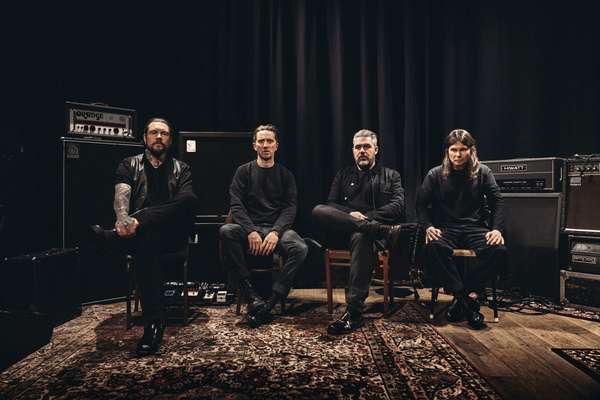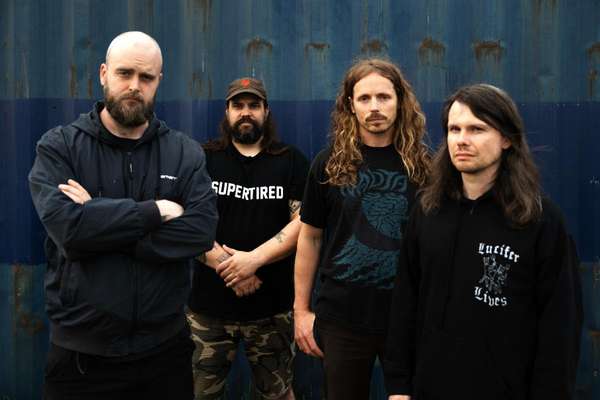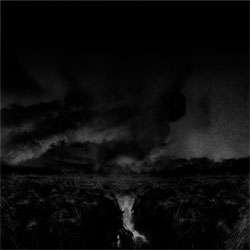I thought it a safe bet to listen to any album off Neurot Recordings with care and patience, and expect something great. Amenra is no fragile exception. Their essence taps a well of meaning seemingly endless on all levels of analysis, as much as it taps a particular sound thrust forward first by Black Sabbath, and most recently by Neurosis. Amenra didn’t invent anything new in Mass VI. The themes, moods, and styles point to a definite lineage. In fact Mass VI lives in a common sound rooted in the critique of modernity, and an ultimate search for meaning further rooted in the culture it disappeared from.
Primarily, Mass VI sucks the listener in through the individual’s religious urge, for lack of a better term, into a modern quest to establish the meaning of this urge. The production value of their album is honest, and powerful. The album sounds as it would on stage in the best possible way, subtly implying the best experience is to see them live. Explicitly “Mass” confirms getting together in a live show is paramount. (If you don’t think music halls are churches, think again.) This is definitely a winning formula, and since music is a useful tool for mystical experience, the more accurate it matches with reality helps conviction. What better way to embolden meaning than do something meaningful in a meaningful way?
Cultural and religious critiques left aside, Amenra’s music reflects a fundamental personality in the Listener, namely, righteous conviction’s need for communion. Unfurling in the need for communion implies an accordance with that which shivers the spine in a solid, thoughtful direction, despite it’s non-reality. In short, Mass VI reflects a basic human need, a justification and necessity to live in the heart.
Is there a crisis of meaning? Yes. Music hasn’t felt it because it is inherently meaningful. Instead music bypasses knowledge, truth, and logic to simulate arresting meaning in chaotic terror using sound. This particular crisis in truths domain has philosophical and metaphysical roots, and cultural and psychological effects that need explaining.
Friedrich Nietzsche (often misquoted) wrote, “god is dead.” He pronounced a spiritual hole in the individual’s life would result. What careless citations get wrong in his statement is he was not triumphantly celebrating the death of god, but he observed, and predicted the devastating consequences of god’s death as a result of Western Civilizations self-immolation. How self-immolation? Because what we decided as valuable in history has negated that value in modernity, like bad computer programing.
Beginning with the Greeks, western thoughts direction established facts, stability, and what stays the same as most valuable. This groundwork implies a creation of categories and what is the same among objects, and concepts as their ‘ideal’ and most real reality. Using a thought path that states truth, stability, and knowledge indeed are important, and powerful. To point out its untruth seems ungrateful. I would be hard pressed to deny ‘truths’ utility, and cut my metaphysical head off. That is not my intention.
Even a core characteristic of Christianity articulates Greek ‘ideals’ personified and deified into story. This implies our world, earthly world, is not ideal, not good enough. So the God is a dangling carrot motivating our search for truth and permanence. We migrate back to the perfect godhead that is our essence in totality. Thought differently, we uncover what the ‘true’ world is through facts. The unforeseen—up until Nietzsche’s condemnation of Christianity, and prophetic 20th century predictions—consequence of the striving for ideal truth as we approach it is we cant make use of it because of our limited biology. We discover its non-intuition, its arbitrariness. Ostensibly, faith in the stability of categories strengthened their power. In actuality, that drive toward fundamental truth uncovered our conception of truth as faulty. Set standards run into error if the values underneath are wrong.
Not only if they are wrong, but if the landscape underneath changes, can all previous beliefs crumble. This is prefigured in music’s essence, and more and more weight is placed on originality than every before in history in order to combat unpredictability and constant change. Essentially a musician practices obsessively, only to forget in performance. It uses the premade forms and traditions as a springboard for evolution into new horizons. It has to acknowledge its tradition, while maintaining its originality, and adhering to mystical properties of harmony, and dissonance. Apparently what is constant isn’t all there is, things change before they can be known. Ideals can stagnant if left too solid; yet, alarmingly, constant change alienates the listener if allowed too much flow.
In efforts to classify too quickly, I’ve seen Amenra labeled as post-rock and post-metal, as if they abandon rock and metal for a freer form of expression, akin to pure originality. I look at my jug of oat milk and it even reads post-milk on it. Ostensibly we live in a post-truth age. Instead of throwing away categories, and genres, Amenra digs deep into a relatively new genre, easily recognizable, yet difficult to name.
Mass VI’s essence is consistent and solid. At the cost of focusing in on the albums mood, each song punctuates the same musical theme limiting it appropriately, yet emphasizing on the emotion behind the music. The album thus cannot be sublime (or a looking glass into the totality of life) because of its specificity. Nor is it their stated aim to ‘cure’ the need for music. Nonetheless, it does illuminate one aspect of emotion, yielding compelling meditation.
The core of the album moves between a loud slow beat with screams overtop quiet singing, and poetic spoken word. When the music needs to be catchy, like in "Plus près de toi," and "Diaken," it delivers uncompromisingly. When it needs to drone on it does so without becoming tedious. The best parts of such a heavy album surprisingly are the quieter singing sections, peppered throughout and heard in "A Solitary Reign" (the most layered song). Each part fits and flows with clarity and cohesion, not in chaos but ordered energy. Power. If we think along 'post-' terms, we fall into a trap as we blind ourselves to Mass VI’s solidity. Post-rock, and post-metal have no real meaning here to the listener. They are misty ideals used as the nebulae of the artist, the musician, in creation: not genres, but techniques of abstraction: ideals equally necessary but fundamentally not there.
Following these trends carefully, Amenra knows all this, whether they’re conscious or not, because they are a direct result of and answer for the meaning crisis. And their answer is introspecting lived experience artistically. Using the familiar as a tool to uncover the unfamiliar, they ride the horse of tradition into concealed reality, piecing it out and absorbing it into their own creation. Their method is not as ethereal as ‘post-rock’ but solidly and clearly articulated. Mass VI is only as successful as it adheres to its predetermined essence.
Another great example of their essence lies in the lyrics. Don’t criminally undermine their affirmative lyrics! Amenra is unapologetically Belgian and make full use of French, Dutch, and English to make a definitive Belgian stamp of artistic unity. They are affirmative in that explicating ones life is harsh, difficult and at times overwhelming, yet worth the trouble. The album is a result and proof positive of that transfiguration.
If truth is at worst unreal, and at best unknowable, it is at least useful. Although the point is to move on, continue to move past what is into what will be, instead of throwing away categories we need to use them, for they are tools only to the extent we all agree in their usefulness. Likewise, if modern music has truly adopted intense introspection as a characteristic, then Amenra gives a little glimmer into our unopened future of struggle and self-enhancement. Clearly, what the album points to is more important that the ground it stands on, for what it points to is new ground, like a discovery of new land on a long journey at sea found inside the heart.









